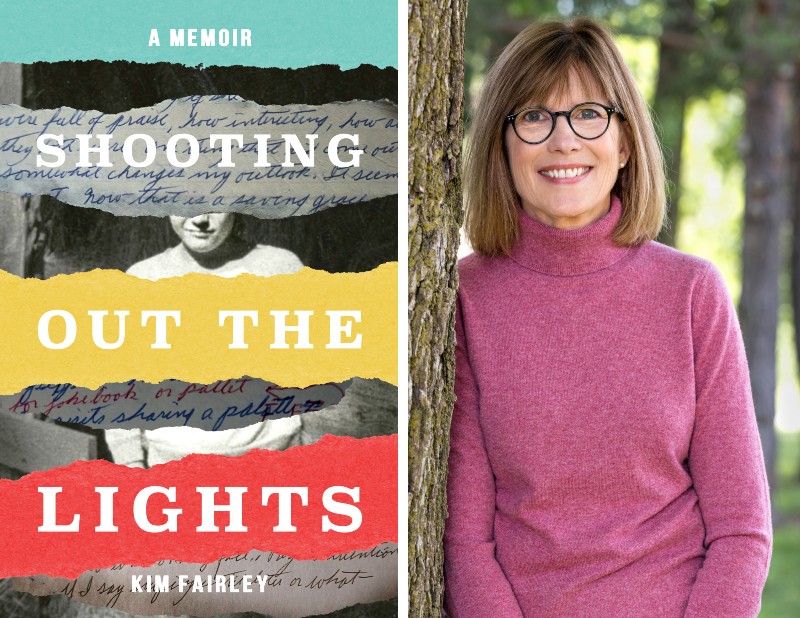He Just Wants to "Fly": Ki5 ponders escape and possibilities in his new song and video

Escape was on the mind of Kyler Wilkins when he wrote the lyrics for his new a capella single and music video, “Fly.” Using only his voice for the melody, harmonies, and beats, the Ypsilanti-based artist known as Ki5 croons the song's chorus, “Can we fly?” with the sort of passion that can make listeners' souls take flight.
Wilkins said the track makes him dream about traveling and the lyrics capture that sense of anticipation, possibility, and geographic movement. The song's lyrics were inspired by the feelings of isolation at the height of the pandemic, and Wilkins' descending vocals during the chorus are meant to mimic the sensation of freefalling in a dream.
The track was co-written and co-produced by Tom Valdez and Janet Cole Valdez, who Wilkins met last year at an online songwriting class. He says “Fly'' was one of the first songs written by the trio, which has written seven total tunes together.
“The funny part is that after the first scratch recording I made the day we wrote some lyrics, I forgot about the song for a few weeks,” Wilkins said. “It was only after coming back later that I was struck by how inviting and enchanting the original idea was. I really began to believe in its magic then.”
The music video for “Fly” features Wilkins' niece, Maxine Wilkins, who choreographed the video and recruited two dancers, Celia Embry and Vee Brzoznowski, to move alongside her. The dancers correlate with the gradual unfolding of the track: in the beginning, there's just one dancer, but as the song blossoms, all three are doing moves together.
You can find the song on Bandcamp and Spotify; catch the music video below:
Journal Entries: Cashmere Washington's reflective new collection provides a therapeutic outlet for the Ypsi singer-songwriter

Cashmere Washington’s The Shape of Things to Come serves as a vulnerable, poignant journal for releasing painful feelings, memories, and experiences.
The Ypsilanti indie rocker eloquently tackles the challenges of relationship abuse, childhood trauma, gender, and identity across six insightful, therapeutic tracks on their new EP, which is part of an ongoing series of journaling-like songs that started as ‘therapy homework’ from my therapist to just write six letters to the people who hurt me and I wanted to let go of," said Washington, aka Thomas Dunn, who is also the hip-hop beatmaker guero. "After I wrote the first four in a week, I liked them so much I couldn’t stop writing."
Backed by raw electric guitars, thumping drums, and roaming bass, The Shape of Things to Come is a powerful outlet to show Washington's inner strength and powerful voice while acknowledging and shedding long-term guilt and shame.
All the Pretty Things: Mirror Monster combines electronics and acoustic instruments to soundtrack cathartic personal journeys

Mirror Monster’s latest EP, Pretty Things Made With All Our Love, extracts the hidden emotional beauty from the bleakest of times. The seven-song collection by the Ann Arbor electronic-experimental duo of David Minnix and Michael Skib is a cathartic, reflective journey that thoughtfully processes internal growth amidst a turbulent external landscape.
Mirror Monster’s enchanting folk-electronica odyssey glides through contemplative tracks about personal losses, the swift passage of time, ethereal encounters, and vivid memories.
“In my view, if you can grow as a human being through the act of creating music, even if nobody buys or listens to it, you’ve still gained something incredibly valuable," said Skib, who formed the project with Minnix in 2019 and named it after a Deerhoof track. "In that sense, I feel a tremendous amount of this success from this project.”
From the Roots: Chris DuPont's heartfelt "Floodplains" explores raw emotions without dwelling in darkness

When Chris DuPont released his latest album, Floodplains, earlier this year, it would have been easy to assume the themes of isolation and loss grew out of the pandemic. Yet all the songs were actually written pre-COVID, the Ypsilanti-based musician explained in a recent email interview.
The album continues DuPont’s remarkable run of thoughtful, heartfelt songwriting brought to life with impeccable singing and musicianship. The album has an intimate feel, highlighted by DuPont’s expressive guitar playing and flawless supporting accompaniment. “Retrieve” leads off the album, musing about how new relationships can heal broken ones, with guest vocalist Olivia Dear enriching the sound.
Several songs have an undercurrent of regret, and there are plenty of examples of DuPont’s knack for arresting lyrics. “Start Again,” featuring Rin Tarsy on vocals, is particularly affecting as DuPont sings, “I have never faced so steep a valley / As the center of the mattress in a wedding bed.” The album closes with touching “In the Lap of the Mountain (Benediction),” concluding that ultimately we all need someone else.
DuPont recently answered some questions about Floodplains:
Author, Screenwriter, and U-M Alum Christopher Cosmos' Debut Novel Covers Characters Caught Up in Greece’s WWII Fight

Author and U-M alum Christopher Cosmos brings alive the historical and personal drama of the Greek resistance during World War II in his new novel, Once We Were Here. When Greece refuses to surrender to Mussolini’s demand for occupation in 1940, the decision sets off a series of events that irrevocably alter the characters’ lives.
The narrative starts in 2014 in Michigan and is told by a grandfather to his grandson. By looking back in time and telling the story, Papou reveals the family’s resilience, romances, losses, and triumphs during the war. The novel is bookended by scenes at this later date. The grandfather starts the tale with a view of what life is like in Agria, Greece on the Aegean Sea before the war. Two friends Alexandros—Alexei —and Constantinos—Costa—have just turned 18, both born on the same night. Alexei is a fisherman and reflects on how a day on his boat feels:
The characters in Erin Hahn’s coming-of-age novel "Never Saw You Coming" grapple with beliefs and trauma in Michigan’s Upper Peninsula

The line between right and wrong is not always clear. Erin Hahn’s new young adult novel, Never Saw You Coming, illustrates the dilemmas that people face when they are told one thing and experience another, leaving them to sort out what they believe.
In the book, 18-year-old Meg Hennessey learns several family secrets at once and goes on a journey to make sense of it all. She grew up in Ann Arbor and travels to Marquette, Michigan, to meet with relatives she previously did not know she had. There, she meets Micah Allen, who likewise has a complicated past. The two of them find an immediate connection complete with witty banter, physical attraction, and outdoor adventures. Chapters alternate between each of their perspectives.
As young adults going through new situations and developing strong feelings for each other, Meg and Micah face uncertainties about whether to listen to religious advice or to follow their intuitions. Purity and abstinence are highly valued in the church, and the pair meets scrutiny even when trying to support church members and follow their values.
Meg reflects, “Before Marquette, I was only a sinner in my heart. Now I’m … out there. Like toothpaste all squeezed out of the tube. I can’t be put back in. And I don’t think I want to be.” She reconsiders the good that can come from bad situations. Her parents’ circumstances are among those situations, and she wonders about the concept of sin:
If God brought my parents together that one time, just to make me, and if it was a blessing planned by God, how could it be a sin? Are sins just blessings being played in God’s long game?
Both Meg and Micah grow and form their own perspectives as they face numerous challenges.
Hahn lives in Ann Arbor, and Never Saw You Coming is her third book. I interviewed her about writing this novel, the choices she made in it, and what’s coming up next for her.
Open Road: Rod Johnson Relishes Cross-Country Adventures on "Looking for a Perfect Trip"

For Ann Arbor singer-songwriter Rod Johnson, a rusty, rattling Ford Econoline van serves as the ideal road-trip companion.
The tank-like vehicle represents carefree, youthful jaunts of the past and promising, independent cross-country journeys of the future on “Telephone Company Surplus Econoline Van" from his latest wanderlust-fueled album, Looking for a Perfect Trip.
“I had a friend in high school that had a telephone company surplus Econoline van, and it was just a Michigan Bell van with a logo painted on it," said Johnson, a retired University of Michigan College of Engineering professor. "We spent a lot of time in that van listening to Alice Cooper, and that’s the van that I was thinking of specifically."
“When I do that song, people always laugh when I say the title. They think it’s going to be this jokey song, but it’s not. It’s always fun to watch their expressions change as you go through it.”
Frosting takes the cake in Ann Arbor blogger Bernice Baran’s new book about sugary delights

Are you a frosting person or a cake person?
I’ve heard people say that one or the other is the reason to eat cake. Ann Arbor blogger and baker Bernice Baran answers that question with frosting in her new book, Frosted.
Thirteen recipes for buttercreams, cream cheese frosting, meringues, Bavarian cream, chocolate ganache, and others are scrumptiously employed to coat and fill layer cakes, sheet cakes, cupcakes, cookies, brownies, bars, breads, and tarts throughout the book. The 60 recipes combine flavors like a Frosted Animal Cracker Cake pictured on the book’s cover, the Chocolate Caramel Macchiato Cookies, Almond Raspberry Cupcakes, and Cookies & Cream Sweet Rolls. The base frosting recipes include variations depending on the flavors for each baked good. Baran also embraces classics like Dark Chocolate Marble Cake, Gingerbread House Cookies, and Chocolate Hazelnut Silk Pie.
Throughout Frosted, Baran nods to her heritage with the recipe for Diplomat Cream from her mother and Hungarian Dobos Torte. Each recipe offers a paragraph about why Baran chose it, how it became part of her repertoire, what is unique about it, or which occasion calls for the treat. With one (or more!) kinds of frosting or sauce, plus the cake or other base, for each recipe, each dessert has many ingredients and steps that appear very worth it from the mouthwatering photographs.
Baran keeps a website to document her baking and sends out an email newsletter. Pulp interviewed her about how she became a baker, what writing Frosted involved, and what inspires her.
Modern Soul(s): Vulfpeck collaborator Antwaun Stanley connected with former My Dear Disco/Ella Riot leader Tyler Duncan for a new EP

Antwaun Stanley's powerful voice sounds like it came from another time, cast from the deep grooves of a 1960s R&B record.
That's why it's always a treat when the Ann Arbor singer appears as a featured vocalist with jam-funk-soul stars Vulfpeck or with one of the other bands for which he's associated.
But a new EP, Ascension, shows Stanley taking a big step forward as a solo artist. The record was made in collaboration with Ann Arbor multi-instrumentalist and producer Tyler Duncan. His impressive resume includes leading the Irish crossover group Millish and the dance-rock project My Dear Disco, aka Ella Riot, as well as producing songs for Carly Rae Jepsen and Lake Street Dive.
The EP isn’t technically Stanley's solo debut—he released a gospel album a few years back—but it does showcase his artistic voice in a new way with a modern R&B sound.
Ascension features three fully developed songs and three largely instrumental interludes. “Speed of Night” recalls old-school R&B, while “Tightrope” offers inspiration through James Blake-like soul-tronica. “Lost in Translation” is the EP's stand-out with its addictive groove, great singing, strong lyrics, and a crackling horn section.
Stanley answered a few questions about the new EP and his other work.
Kim Fairley’s Memoir "Shooting Out the Lights" Tells the Story of Navigating Her First Year of Marriage and an Unwanted Guest

Ann Arbor artist and writer Kim Fairley recalls the early days of her marriage to Vern Fairley and a visit from an unwelcome guest in her new memoir, Shooting Out the Lights. This fast-moving book focuses on what it was like to start a marriage amidst a big age gap, the aftermath of tragedy, and the contentious circumstances of an unrelated child who comes to stay with the couple. Fairley tells the story with humor and tenderness.
While Fairley quickly becomes pregnant at 25 after they married in 1982, the memories of Ben, Vern’s son who died in an accidental shooting, haunt them. Vern agrees to take in Stanislaus, an 11-year-old son of a friend, and their newlywed days are interrupted. The unwanted responsibility forces the couple to face what happened in the past and look ahead to their growing family.
A relic of the past is Ben’s bedroom, which had remained largely the same since his death. Fairley considers cleaning out the room in preparation for the new baby. She reflects on the task and its larger implications:
Does it matter to leave a legacy? My mother, jokingly, always said she wanted her endless pile of laundry done before she died. My father wanted to be missed by my mother. Maybe all that mattered was the here and now. Nobody two hundred years in the future would care a whit about any of us. It was the reality of Vern’s age and the recognition that he wouldn’t live forever that was getting to me.
Fairley is forced to confront change and mortality amidst the joy of starting a family, and she looks back with the clarity of time. She adds, “Vern had contradictory impulses, as we all do, about whether to hang on or let go, preserve or move forward.” The dilemma is relatable, but it doesn’t make the choice any easier.
Shooting Out the Lights is Fairley's second book. I interviewed her about what it was like to write this story.


































